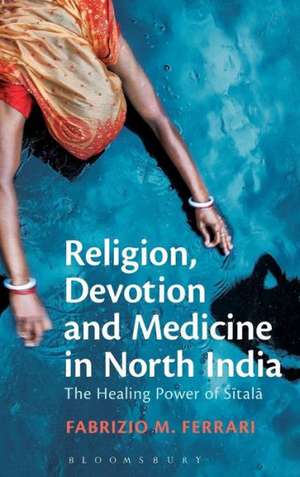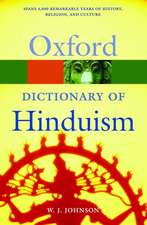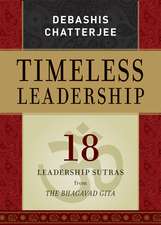Religion, Devotion and Medicine in North India: The Healing Power of Sitala
Autor Dr Fabrizio M. Ferrarien Limba Engleză Hardback – 19 noi 2014
| Toate formatele și edițiile | Preț | Express |
|---|---|---|
| Paperback (1) | 218.47 lei 43-57 zile | |
| Bloomsbury Publishing – 19 noi 2014 | 218.47 lei 43-57 zile | |
| Hardback (1) | 715.58 lei 43-57 zile | |
| Bloomsbury Publishing – 19 noi 2014 | 715.58 lei 43-57 zile |
Preț: 715.58 lei
Preț vechi: 916.06 lei
-22% Nou
Puncte Express: 1073
Preț estimativ în valută:
136.97€ • 148.83$ • 115.13£
136.97€ • 148.83$ • 115.13£
Carte tipărită la comandă
Livrare economică 21 aprilie-05 mai
Preluare comenzi: 021 569.72.76
Specificații
ISBN-13: 9781441148292
ISBN-10: 1441148299
Pagini: 256
Ilustrații: 13 bw illus
Dimensiuni: 156 x 234 x 16 mm
Greutate: 0.54 kg
Editura: Bloomsbury Publishing
Colecția Bloomsbury Academic
Locul publicării:London, United Kingdom
ISBN-10: 1441148299
Pagini: 256
Ilustrații: 13 bw illus
Dimensiuni: 156 x 234 x 16 mm
Greutate: 0.54 kg
Editura: Bloomsbury Publishing
Colecția Bloomsbury Academic
Locul publicării:London, United Kingdom
Caracteristici
First examination of the impact of new pandemics and 'blameful' behaviour in Hindu village contexts.
Notă biografică
Fabrizio M. Ferrari is Professor of Religious Studies at the University of Chester, UK.
Cuprins
AcknowledgementsList of illustrations Note on transliterationAbbreviations Months in north India IntroductionChapter 1: Sitala, the Cold Mother Chapter 2: Visions of the goddess. The iconography of Sitala Chapter 3: Hosting Ma, feeding Ma. Controversies around SitalapujaChapter 4: The smallpox myth and the creation of the goddess of smallpox Chapter 5: The legacy of SitalaConcluding reflectionsAppendix A. Srisitalasaptamivratakatha (Srisriyantrapi?ham, Vara?asi)Appendix B. Srisitalasaptamivrata of Skandapura?aAppendix C. Sitalasaptamivratakatha of Bhavi?yapura?aAppendix D. Sitalapujapaddhati of PicchilatantraBibliography Index
Recenzii
In Religion, Devotion and Medicine in North India the author analyses an extensive range of Indian textual and iconographic sources dating back over a millennium and convincingly demolishes the myth that the deity Sitala is a malevolent village "smallpox goddess". After this fascinating study scholarship must henceforth recognise Sitala as a benevolent goddess whose compassion is invoked, primarily by female worshipers, for the protection of children.
In this provocative study of an Indian healing goddess, Sitala, Ferrari draws from an impressive array of sources to counter a prevailing narrative of a "capricious goddess of smallpox." Juxtaposing ethnographic vignettes and Sanskrit and vernacular sources on Sitala of the past millennium, it presents an innovative reading of an "an~calik (i.e. polyphonic)" culture where multifarious ritual practices and orthodox voices intersect around a figure of a cool, motherly goddess. Anyone interested in healing practices and goddess cult in contemporary India will find it a surprising treasure.
In this provocative study of an Indian healing goddess, Sitala, Ferrari draws from an impressive array of sources to counter a prevailing narrative of a "capricious goddess of smallpox." Juxtaposing ethnographic vignettes and Sanskrit and vernacular sources on Sitala of the past millennium, it presents an innovative reading of an "an~calik (i.e. polyphonic)" culture where multifarious ritual practices and orthodox voices intersect around a figure of a cool, motherly goddess. Anyone interested in healing practices and goddess cult in contemporary India will find it a surprising treasure.











